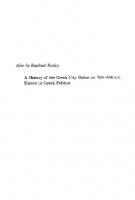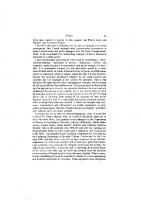Thrasybulus and the Athenian Democracy: The Life of an Athenian Statesman 3515072217, 9783515072212
"Die wissenschaftliche Welt wie alle an der Geschichte Griechenlands im klassischen Zeitalter Interessierten überha
138 33 43MB
English Pages 141 [147] Year 1998
Contents
Chapter 1 - Introduction: Sources and Scholarship
The Age of Thrasybulus
Sources
Modern Scholarship
Chapter 2 - Thrasybulus: His Early Life and Career, ca. 450-407 B.C.
Birth and Family
The Revolution of the Four Hundred
Cynossema
Abydos
Cyzicus
Campaigns to 406: Notium
Thrasybulus' Character
Chapter 3 - Arginusae and the Thirty 407-403 B.E.
Arginusae
The Aftermath: the Shipwrecked Sailors and the Trial of the Generals
The Peace and the Thirty
The Purges
Thrasybulus in Exile
Boeotia cools to Sparta
Boeotia and Athens
Chapter 4 - The Overthrow of the Thirty and the Restoration of Democracy, 403-396 B.C.
Phyle
Logistics
First Skirmishes
Battle of Acharnae
Massacre at Eleusis
Battle of Munychia
The Ten
Spartan Intervention: Lysander and Pausanias
The Reconciliation (September, 403)
Renewed Democracy: Archinus
Factions at Athens
Dominance of Thrasybulus
Relations with Sparta
Socrates
Thrasybulus the Moderate
Persia and Sparta
Chapter 5 - The First Two Years of the Corinthian War: Thrasybulus and Conon 395-394 B.C.
Timocrates of Rhodes
The Outbreak of the War
The Athenian Alliance
The Battle of Haliartus
The Congress and Alliance
The Battle of Nemea
The Battle of Coronea
Chapter 6 - The Corinthian War: Thrasybulus and the New Athenian Empire 393-389 B.C.
Conon Triumphant
The Downfall of Conon
The Situation in the Aegean
Affairs at Athens
The Campaigns of Thrasybulus
After Thrasybulus' Death
Chapter 7 - Thrasybulus and Athens 450-389 B.C.
Appendix
Chronology
Bibliography
General Index
Index of Ancient Authors and Sources
Recommend Papers

- Author / Uploaded
- Robert J. Buck
File loading please wait...
Citation preview
ROBERT J. BUCK THRASYBULUS AND THE ATHENIAN DEMOCRACY
HISTORIA ZEITSCHRIFT FÜR ALTE GESCHICHTE· REVUE D'HISTOIRE ANCIENNE·JOURNAL OF ANCIENT HISTORY· RIVISTA DI STORIA ANTICA
EINZELSCHRIFTEN HERAUSGEGEBEN VON MORTlMER CHAMBERS I LOS ANGELES . HEINZ HEINEN I TRIER FRAN 'tptf!upxoi 'tE 'toov i\811vuirov KUt öuva'tonu'tot, 'the trierarchs and the most powerful men among the Athenians in Samos.' 30 Thucydides has been interpreted by Kagan 31 as including alt the trierarchs present. Presum23 24 25 26 27 28 29 30 31
Thuc. 8.17.3, 8.19.2. Thuc. 8.21; cf. Gomme et al. 1945-81,5:44-47. Thuc. 8.21. Thuc. 8.23.1. Thuc.8.25.1. Thuc. 8.30.1. Thuc. 8.30.2. Thuc.8.47.2. Kagan 1987, 113-117.
24
Career to Notium
ably among these was Thrasybulus, if he was there. They were already contemplating some sort of coup when Alcibiades intervened. Thucydides claims that Alcibiades had plans to gain influence with Tissaphernes, the Persian satrap, and to engineer his own return to Athens. Life was getting too risky and unpleasant for hirn among the Spartans. He was, inter aha, on very bad terms with King Agis. Rumour had it thatAlcibiades' affair with Agis' queen was not unconnected with Agis' hostility.32 Alcibiades got in touch with these powerful men at Samos and let it be known that the price for his good offices with Tissaphernes (and consequent funding from the Persians) was the overthrow of the democracy that had exiled hirn. The majority of the leaders at Samos accepted his terms, though one of the opponents was Phrynichus. They got in touch with discontented elements in Athens, and a delegation was sent to negotiate with Alcibiades. In Athens, the öuvo'to)'to'tOt, the 'most powerful,' began to be enthusiastic about the idea of overthrowing democracy.33 The soldiers and sailors at Samos were informed and voted to support the deal with Alcibiades and the necessary change to oligarchy, especially as it presented the prospect of regular pay, though apparently they did so with some hesitation. 34 Pisander, a radical democratic politician, and a considerable orator who had been one of the trierarchs,35 was sent to Athens by the leaders of the fleet. He persuaded the reluctant assembly that if Athens wanted financial and military aid from Tissaphernes and the Persian King (via Alcibiades), then they had to install an 0ligarchy.36 The assembly gave way, and authorized hirn, with ten others, to negotiate with Tissaphernes at Sardis. Before he left, Pisander did two things. First, he obtained the dismissal of Phrynichus from his generalship because of his handling of the Miletus affair; Phrynichus and another dismissed general, Scironides, returned horne in Pisander's absence and soon became deeply involved in promoting the oligarchy. Diomedon and Leon, supporters of democracy, were sent out to replace them. 37 Second, Pisander made contact with the synomosiai (cruvffillOcrtm), the political clubs, and organized them to subvert the democracy.38
32 33 34 35 36 37
38
Plut. Ale. 24.2. Thuc.8.48.1. Thuc. 8.48.3. Note Thucydides' contemptuous dismissal of the 'mob,' 0 ÖXAO









